Intro
Discover 5 essential progesterone contraception tips for effective birth control, including hormonal balance, menstrual regulation, and pregnancy prevention methods, to make informed decisions about reproductive health and fertility management.
The importance of contraception cannot be overstated, as it allows individuals to plan their families and make informed decisions about their reproductive health. One popular form of contraception is progesterone contraception, which has been widely used by women around the world. Progesterone is a hormone that plays a crucial role in the menstrual cycle and pregnancy, and when used as a form of contraception, it can be highly effective in preventing pregnancy. In this article, we will explore the world of progesterone contraception and provide valuable tips for those considering this option.
Progesterone contraception works by preventing ovulation, thickening cervical mucus to prevent sperm from reaching the egg, and thinning the lining of the uterus to prevent implantation. This form of contraception is available in various forms, including pills, injections, implants, and intrauterine devices (IUDs). With so many options available, it can be overwhelming to choose the right one. However, with the right guidance and information, individuals can make informed decisions about their reproductive health.
For those considering progesterone contraception, it is essential to understand the benefits and potential side effects. One of the significant advantages of progesterone contraception is its high effectiveness in preventing pregnancy. When used correctly, progesterone contraception can be up to 99% effective, making it a reliable option for those who want to plan their families. Additionally, progesterone contraception can also help regulate menstrual cycles, reduce menstrual cramps, and decrease the risk of certain health conditions, such as endometrial cancer.
Understanding Progesterone Contraception
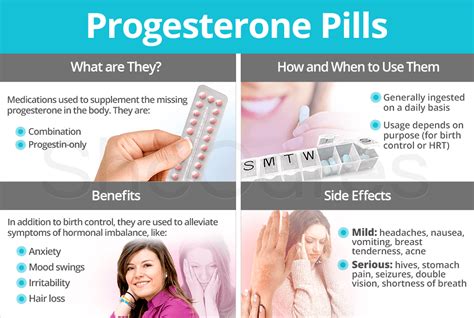
Benefits of Progesterone Contraception
The benefits of progesterone contraception are numerous, and individuals who use this form of contraception can experience a range of advantages. Some of the benefits of progesterone contraception include: * High effectiveness in preventing pregnancy * Regulation of menstrual cycles * Reduction of menstrual cramps * Decreased risk of certain health conditions, such as endometrial cancer * Convenience and ease of use * Variety of options available, including pills, injections, implants, and IUDsTypes of Progesterone Contraception
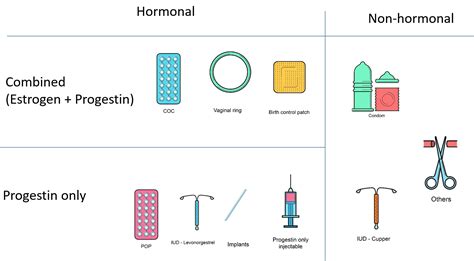
Choosing the Right Type of Progesterone Contraception
Choosing the right type of progesterone contraception can be overwhelming, but individuals should consider their lifestyle, health, and personal preferences when making a decision. Some factors to consider include: * Effectiveness: How important is it to prevent pregnancy? * Convenience: How easy is it to use the contraception? * Side effects: What are the potential side effects of the contraception? * Cost: What is the cost of the contraception? * Lifestyle: How will the contraception fit into daily life?Progesterone Contraception Tips
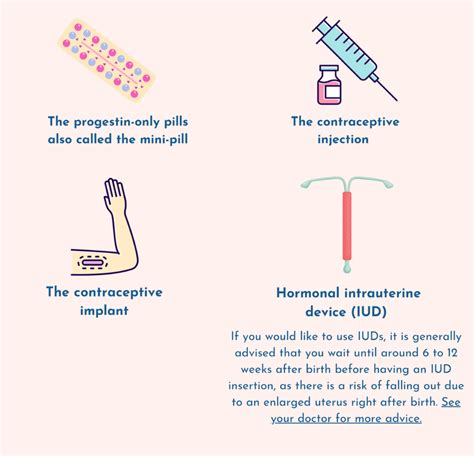
Common Side Effects of Progesterone Contraception
While progesterone contraception is generally safe and effective, there are some potential side effects to be aware of. Some common side effects include: * Weight gain * Breast tenderness * Mood changes * Headaches * Dizziness * Nausea * Vaginal bleeding or spottingProgesterone Contraception and Lifestyle

Progesterone Contraception and Relationships
Progesterone contraception can have an impact on relationships, and individuals should consider their partner's feelings and preferences when choosing a type of contraception. Some factors to consider include: * Communication: How will the contraception be discussed with partners? * Intimacy: How will the contraception affect intimacy? * Trust: How will the contraception affect trust in the relationship?Progesterone Contraception and Health
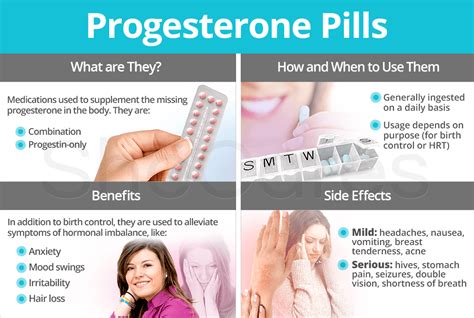
Progesterone Contraception and Medical Conditions
Progesterone contraception can be affected by medical conditions, and individuals should consult with their healthcare provider to determine the best option for their needs. Some medical conditions that may affect progesterone contraception include: * High blood pressure * Diabetes * Migraines * Epilepsy * Liver diseaseConclusion and Next Steps
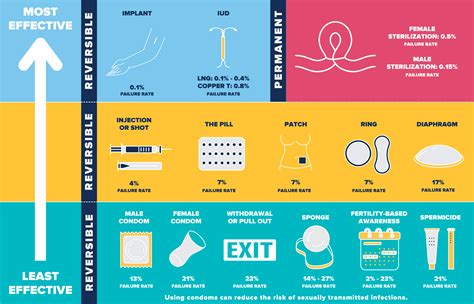
We invite you to share your thoughts and experiences with progesterone contraception in the comments below. If you have any questions or concerns, please do not hesitate to reach out to us. Additionally, we encourage you to share this article with others who may be considering progesterone contraception as an option.
What is progesterone contraception?
+Progesterone contraception is a form of contraception that uses the hormone progesterone to prevent pregnancy. It is available in various forms, including pills, injections, implants, and IUDs.
How effective is progesterone contraception?
+Progesterone contraception is highly effective in preventing pregnancy, with a success rate of up to 99% when used correctly.
What are the potential side effects of progesterone contraception?
+Common side effects of progesterone contraception include weight gain, breast tenderness, mood changes, headaches, dizziness, nausea, and vaginal bleeding or spotting.
Can I use progesterone contraception if I have a medical condition?
+It is essential to consult with a healthcare provider to determine if progesterone contraception is suitable for individuals with medical conditions. Certain medical conditions, such as high blood pressure, diabetes, and liver disease, may affect the use of progesterone contraception.
How do I choose the right type of progesterone contraception for my needs?
+It is essential to consult with a healthcare provider to determine the best type of progesterone contraception for individual needs. Factors to consider include lifestyle, health, and personal preferences.
